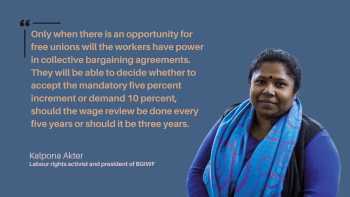Can the goverment ignore new US labour policy?

On November 16, US Secretary of State Antony J Blinken, at the rollout of the Presidential Memorandum on "Advancing Worker Empowerment, Rights, and High Labor Standards Globally," stated that the United States would work to hold accountable those who threaten, intimidate and attack union leaders, labour rights defenders and labour organisations. The memorandum, signed by President Joe Biden, says that the country will consider "appropriate responses to international anti-worker and anti-union harassment from government, private, and extralegal actors, including the use of spurious lawsuits; and violence, including deploying the full rage of diplomatic and assistance tools and, as appropriate, financial sanctions, trade penalties, visa restrictions, and other actions."
The announcement comes amid intense worker rights protests in Bangladesh preceding and following the declaration of Tk 12,500 as the minimum wage of the RMG sector. At least four workers have been killed in the crackdown on the protesters by security forces since October 31, and over 23,000 workers have been sued in at least 62 cases, according to IndustriALL Bangladesh Council (IBC). Voices from within Bangladesh, including unions and civil society actors, have repeatedly called upon the government and owners to handle the ongoing protests sensitively, recognising the workers' demands for a dignified life amid a debilitating cost-of-living crisis. However, the government seems to have doubled down on its stance—over 100 workers have already been arrested and others are reportedly being attacked or threatened by both state and non-state actors. With the announcement of the new US policy, can the government afford to continue to ignore the country's pressing labour and human rights concerns?
The latest announcement must also be read alongside the escalating tensions between the US and the Awami League government over the upcoming elections, and prior visa restrictions on Bangladeshi individuals responsible for, or complicit in, undermining the democratic election process in Bangladesh. The ruling party seems to have taken the repeated warnings—including the visa sanctions—from the US about its failure to uphold democratic norms with a grain of salt. But can it really disregard the fact that the US is the single largest export destination for our country, with $9.4 billion worth of apparels exported in FY2022? It is high time our policymakers seriously assessed the long-term implications of possible financial sanctions and trade penalties on the RMG industry, on which our economy—which is already suffering on multiple fronts—is heavily dependent. The Awami League needs to think beyond sanctimonious rhetoric and its own agenda, and consider the severe repercussions of its current diplomatic approach on the country, industry and workers at large.
We have repeatedly urged the government to uphold labour rights, human rights and democracy—not to appease any external actor, but for the sake of our own people. Why should workers, labour leaders and organisations be harassed, intimidated or attacked for asking for their due rights in a country built on the back of its workers? We once again call upon the government, as well as the industry leaders who appear worried about the latest US policy, to prioritise worker rights and respond to their demands with respect, not retaliation, if they truly care about the industry's future.


 For all latest news, follow The Daily Star's Google News channel.
For all latest news, follow The Daily Star's Google News channel. 










Comments